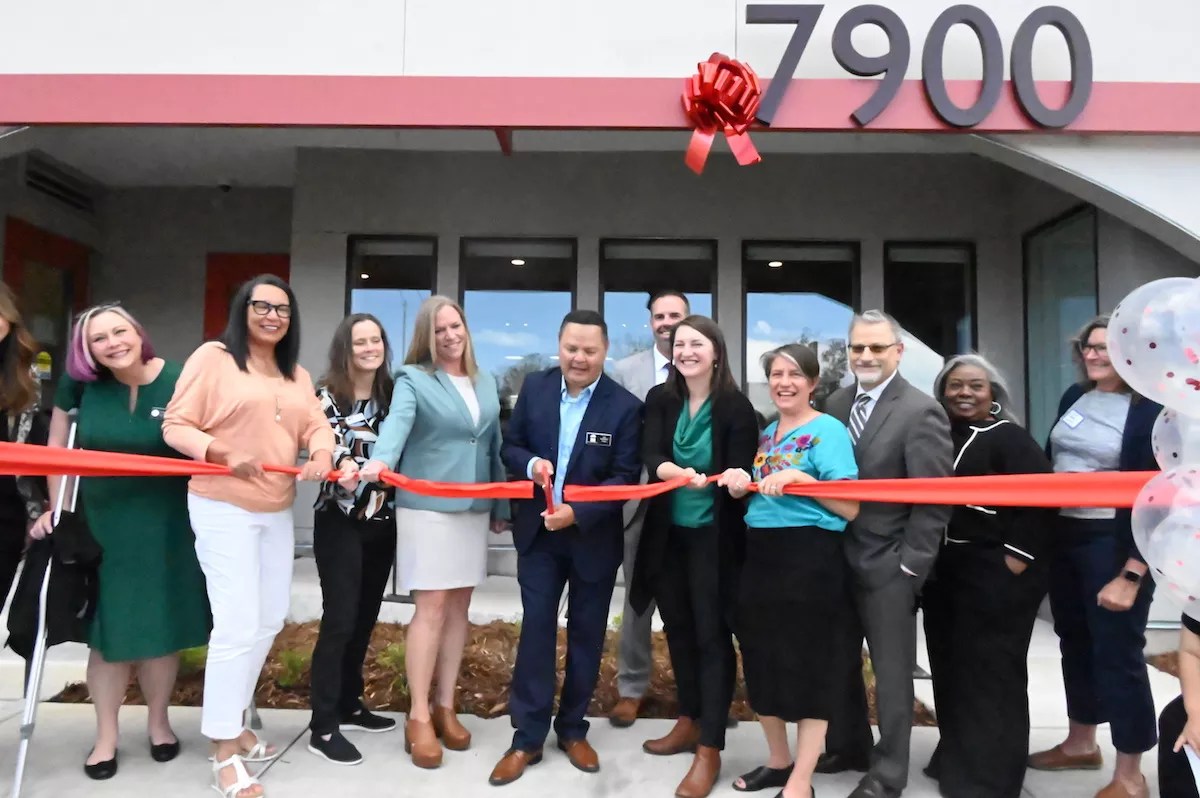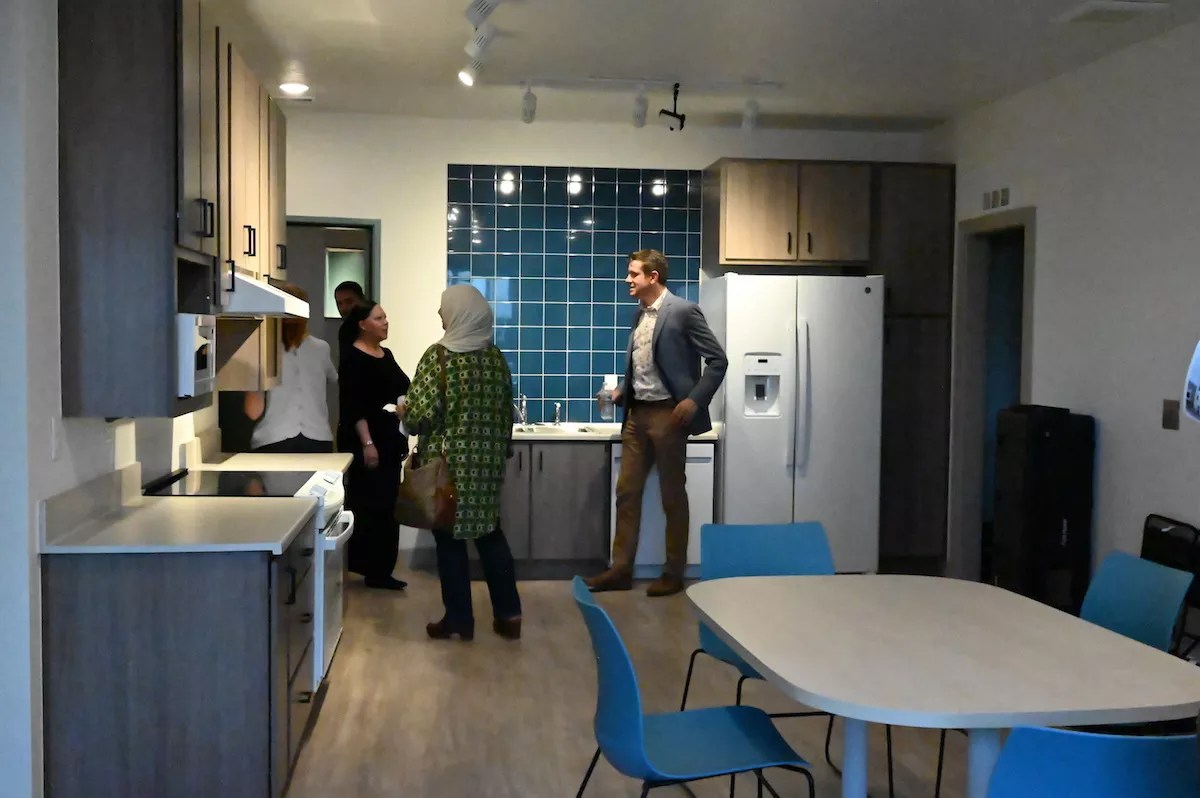
Bennito L. Kelty

Audio By Carbonatix
Touting it as a first-of-its-kind facility, a metro partnership has just opened a $25-million, 72-unit affordable-housing complex on East Colfax built for people with traumatic brain injuries; the project had been in the works for nearly half a decade.
A rare combination of housing and clinical services, Valor on the Fax was constructed by Brothers Redevelopment Inc. through a partnership with the City of Denver, the Brain Injury Alliance of Colorado, Shopworks, the Colorado Housing and Finance Authority, Enterprise Financial and Calcon Constructors.
The group had a vision of what affordable housing and clinical services could look like in the Mile High City, regardless of where the combined space was located or how things looked in the area before developers and construction crews moved in.
“From the moment we walked onto what was once a dirty, dilapidated, potholed lot here, I think we saw…what would be possible if we see this vision through,” said Jeff Martinez, president of Brothers Redevelopment, at the May 17 ribbon-cutting ceremony.
Brothers Redevelopment, an affordable-housing builder, and the nonprofit Brain Injury Alliance teamed up to make a competitive and successful bid for the property in 2019, when about 13 percent of Denver’s homeless population screened positive for a TBI. Now stats show that as much as 65 percent of Colorado’s homeless population will test positive for a lifetime history of brain injuries, according to Kate Kerkmans, CEO of the Brain Injury Alliance of Colorado.
People with TBIs are also stuck at employment rates 10 to 40 percent lower than where they were before suffering a brain injury, Kerkmans says.
“So when this opportunity came up, we already knew how important it was,” she explains. “We knew that the need was there. What we hoped for was that we could step in and make an impact.”
The apartment complex is expected to be filled up by the end of May, according to Martinez, but at least 48 residents have moved in since early April, when the building technically opened. To qualify for a unit, residents need to be making less than 30 percent of the Area Median Income – which in Denver is less than $24,650 for a single resident or less than $31,650 for a household of three.
Residents must note that they have a TBI and are disabled on their application, but they must also be getting help from the Brain Injury Alliance of Colorado, Martinez says.
The applicants are already verified as being in need of housing before they apply. Residents are also found through the OneHome coordinated entry system.
The Brain Injury Alliance and Brothers Redevelopment count those with TBI as people who have been severely hit in the head, had a concussion or suffered a stroke and possibly hypoxia, which is a loss of oxygen. These types of injuries are often tied to homelessness because they occur while people are living on the street, and also because people often struggle to work, maintain jobs and make bill payments as a result of their injuries and subsequently fall into financial despair.

Miles Gonzalez, an area manager for Brothers Redevelopment, shows curious visitors what the three-bedroom units look like at Valor on the Fax.
Bennito L. Kelty
Valor on the Fax is designed to make people with brain injuries feel more comfortable. It has soft lighting in the rooms, natural lighting in the group areas, and heavy windows that block sound, as brain injuries often leave people sensitive to light and sound.
The rooms and hallways are painted a baby blue – with dark-blue tiles and various shades of white for walls and appliances; the colors were chosen because they’re easier on the eyes of people with brain injuries. Most corners on counters and tables inside the units are rounded in case residents bump into them.
The apartments vary between one-, two- and three-bedroom units; the three-bedrooms are 850 square feet and ADA-compliant, with walk-in showers and room for wheelchairs to traverse the hallways.
Valor will offer on-site resources such as classes, support groups, mental health services, peer mentorship programs and adaptive recreational activities meant to include people with disabilities.
“Our hope is that by combining these trauma-informed elements, trauma-informed care and really specifically trained staff, we keep people housed longer, maybe even permanently,” Kerkmans says.
Brother Redevelopment broke ground on Valor on the Fax in 2021. The City of Denver had bought the property at 1490 Trenton Street, which used to be a bar located across from a strip club with a historic “Nude Dancing” sign, in 2017 for $650,000 as part of a land-acquisition strategy to build more affordable housing.
Brothers Redevelopment is already planning to build similar facilities that mix housing and specialized services. The company is working with AllHealth Network to create affordable housing in Aurora for people trying to restart their lives after coming out of prison and the criminal justice system. It already has $3 million in federal COVID-19 relief funding from Arapahoe County, Martinez says.